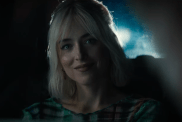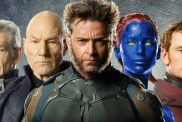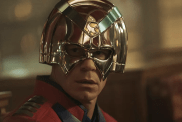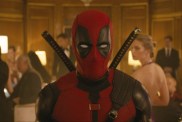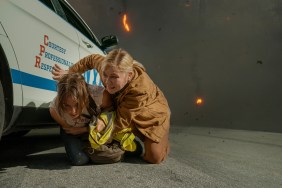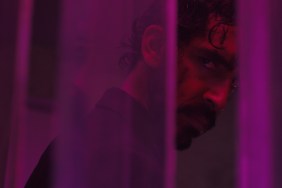
8.5 out of 10
Cast:
Christian Bale as Dr. Michael Burry
Steve Carell as Mark Baum
Ryan Gosling as Jared Vennett
Brad Pitt as Ben Ricket
John Magaro as Charlie Geller
Finn Wittrock as Jamie Shipley
Jeremy Strong as Vinny Daniel
Rafe Spall as Danny Moses
Hamish Linklater as Porter Collins
Marisa Tomei as Cynthia Baum
Directed by Adam McKay
The Big Short Review:
Narrative film (and its close cousin television) is the greatest reductionist in the world: it has the ability to transmit complex notions past the highest cultural barriers, but only by reducing them to the most digestible of pieces. In the process, it tends to shrink and cut up complex ideas so thoroughly they end up completely different (if not having opposite meanings) to the notions they started as.
The terrible irony then is that the medium which should have the best ability to keep us informed instead tends to do the opposite, and raises a high bar for anyone who should attempt to try and explain via film anyway.
Co-writer/director Adam McKay (Anchorman) is going to try regardless and to cover one of the most arcane and complex subjects of the past generation: the causes of the Great Recession. No one understands what caused the financial crisis, including the people who actually did the causing, which is by design, but unwrapping that complexity is key to making sure it doesn’t happen again.
The fact that The Big Short is able to grapple with such a complex and detailed subject so gracefully is a big part of its brilliance. Realizing from go that this particular type of story will require a fair amount of exposition, McKay leans into that reality rather than trying bury it inside forced drama.
The process of the crisis, and the mixture of fraud and stupidity underlying it, is the drama and McKay keeps it front and center through a willingness to let the characters stop, turn to the camera and directly lay out a complex financial point such as what exactly a collateralized debt obligation is. When faced with some particularly dry or challenging issue, he ups the ante with the help of a comically compelling visual medium like Margot Robbie in a bubble bath.
It keeps The Big Short amazingly light and breezy even as it dives headfirst into the maddening waters of Wall Street, where the everyday shenanigans are actually dark and angering. Rather than light entertainment, they’re more likely to create a man like cantankerous anti-banker Mark Baum (Carell), the type of insider who generally hates his field but who is also far enough outside of it that they realize the housing market has a fundamental flaw the rest of the world had not yet realized: housing values could not go up forever.
Sniffing out opportunity (and its frequent friend calamity), the short-sellers dig deeper and deeper into the strange convocations of the American housing market and find to their horror it is turtles all the way down. Though many of the characters have no particular connection to each other beyond their belief in the imminent failure of the housing market – Christian Bale, in fact, does all of his scenes from one set and is only in the same time zone as the other characters once – McKay and co-writer Charles Randolph have no problem twisting real life to fit a three-act structure and unity of information but are smart enough to take advantage of the same explainer style to subvert the characteristics of a ‘based on a true story’ story.
While simultaneously using classic ‘meet-cute’ pieces of improbable connection to bring disparate pieces of plot together, The Big Short will stop and admit that such things didn’t actually happen, but the real events were banal and un-cinematic. It’s a bit of ‘have your cake and eat it, too’ that’s so audacious respect has to be given to it. It’s because the film handles its business with an absurdly light touch – helped along by circa-2000 Sorkin-like dialogue – without ever losing its sense of humor that it succeeds so well with potentially frustrating material.
If it has a flaw it’s that its sights are set too high: explaining all of this without missing important details isn’t enough, sometimes it remembers that it wants to be a conventional drama as well. That’s mostly the realm of Mark’s dead brother, a device to explain his desire to confront and fix the problems of first-world society and more importantly to hero a man who will ultimately make millions off the failure of the American economy.
Normally the inclusion of human drama instead of explanations about yield curves and synthetic CDOs would be obviously necessary, but here it’s a nuisance. The excitement is about watching the characters put together the pieces of the ugly whole we already know they will find and the drama comes from the deep hole they will fall down before what we know must happen comes to pass.
As the inevitable begins and American mortgage defaults mount the banks behind the system refuse to budge, leaving the short-sellers staring down the maw of bankruptcy despite being right and opening the world up to the true corruption and collusion underlying the banking system.
If that sounds hopelessly pessimistic, well, The Big Short is an extremely pessimistic film even if it cloaks that fact in song and dance. One scratch beneath that cynical shell, as the saying goes truly lies an optimist, one who believes that it is not necessarily human nature to always be getting one over on your neighbor because you can.
McKay’s necessary and painful deconstruction of a fundamental cultural event understands it will never be understood the way it should without mass entertainment taking up the gauntlet, because no other voice will insure the investigation continues.
And continue it must. The questions which remain – how much did the banks really know about what they were doing, where is the line between stupidity and illegality – will likely never be known much less regulated, which makes a constant dialogue about them all the more important.
The Big Short
-
The Big Short

Christian Bale plays Michael Burry in The Big Short from Paramount Pictures and Regency Enterprises
-
The Big Short

Christian Bale plays Michael Burry in The Big Short from Paramount Pictures and Regency Enterprises
-
The Big Short

Tracy Letts plays Lawrence Fields in The Big Short from Paramount Pictures and Regency Enterprises
-
The Big Short

Left to right: Tracy Letts plays Lawrence Fields, Wayne Pere plays Martin Blaine and Christian Bale plays Michael Burry in The Big Short from Paramount Pictures and Regency Enterprises
-
The Big Short

Christian Bale plays Michael Burry in The Big Short from Paramount Pictures and Regency Enterprises
-
The Big Short

Christian Bale plays Michael Burry in The Big Short from Paramount Pictures and Regency Enterprises
-
The Big Short

Christian Bale plays Michael Burry in The Big Short from Paramount Pictures and Regency Enterprises
-
The Big Short

Left to right: Finn Wittrock plays Jamie Shipley and John Magaro plays Charlie Geller in The Big Short from Paramount Pictures and Regency Enterprises
-
The Big Short

Left to right: John Magaro plays Charlie Geller and Finn Wittrock plays Jamie Shipley in The Big Short from Paramount Pictures and Regency Enterprises
-
The Big Short

-
The Big Short

Left to right: Finn Wittrock plays Jamie Shipley and John Magaro plays Charlie Geller in The Big Short from Paramount Pictures and Regency Enterprises
-
The Big Short

John Magaro plays Charlie Geller in The Big Short from Paramount Pictures and Regency Enterprises
-
The Big Short

Melissa Leo plays Georgia Hale in The Big Short from Paramount Pictures and Regency Enterprises
-
The Big Short

Steve Carell plays Mark Baum in The Big Short from Paramount Pictures and Regency Enterprises
-
The Big Short

Left to right: Steve Carell plays Mark Baum and Ryan Gosling plays Jared Vennett in The Big Short from Paramount Pictures and Regency Enterprises
-
The Big Short

Left to right: Billy Magnussen plays Maroon and Max Greenfield plays Black in The Big Short from Paramount Pictures and Regency Enterprises
-
The Big Short

Adepero Oduye plays Kathy Tao in The Big Short from Paramount Pictures and Regency Enterprises
-
The Big Short

Steve Carell plays Mark Baum in The Big Short from Paramount Pictures and Regency Enterprises
-
The Big Short

Left to right: Rafe Spall plays Danny Moses and Jeremy Strong plays Vinnie Daniel in The Big Short from Paramount Pictures and Regency Enterprises
-
The Big Short

Hamish Linklater plays Porter Collins in The Big Short from Paramount Pictures and Regency Enterprises
-
The Big Short

Left to right: Hamish Linklater plays Porter Collins and Rafe Spall plays Danny Moses in The Big Short from Paramount Pictures and Regency Enterprises
-
The Big Short

Jeremy Strong plays Vinnie Daniel in The Big Short from Paramount Pictures and Regency Enterprises
-
The Big Short

Left to right: Ryan Gosling plays Jared Vennett and Jeffry Griffin plays Chris in The Big Short from Paramount Pictures and Regency Enterprises
-
The Big Short

Ryan Gosling plays Jared Vennett in The Big Short from Paramount Pictures and Regency Enterprises
-
The Big Short

Left to right: Jeremy Strong plays Vinnie Daniel, Rafe Spall plays Danny Moses, Hamish Linklater plays Porter Collins, Steve Carell plays Mark Baum, Jeffry Griffin plays Chris and Ryan Gosling plays Jared Vennett in The Big Short from Paramount Pictures and Regency Enterprises
-
The Big Short

Ryan Gosling plays Jared Vennett in The Big Short from Paramount Pictures and Regency Enterprises
-
The Big Short

Left to right: Jeremy Strong plays Vinnie Daniel, Steve Carell plays Mark Baum, Hamish Linklater plays Porter Collins and Rafe Spall plays Danny Moses in The Big Short from Paramount Pictures and Regency Enterprises
-
The Big Short

Left to right: Hamish Linklater plays Porter Collins, Jeremy Strong plays Vinnie Daniel, Steve Carell plays Mark Baum, Ryan Gosling (rear) plays Jared Vennett and Rafe Spall plays Danny Moses in The Big Short from Paramount Pictures and Regency Enterprises
-
The Big Short

Left to right: Ryan Gosling plays Jared Vennett and Jeffry Griffin plays Chris in The Big Short from Paramount Pictures and Regency Enterprises
-
The Big Short

Left to right: Byron Mann plays Mr. Chau and Steve Carell plays Mark Baum in The Big Short from Paramount Pictures and Regency Enterprises
-
The Big Short

Byron Mann plays Mr. Chau in The Big Short from Paramount Pictures and Regency Enterprises
-
The Big Short

Steve Carell plays Mark Baum in The Big Short from Paramount Pictures and Regency Enterprises
-
The Big Short

Left to right: Jeremy Strong plays Vinnie Daniel, Hamish Linklater plays Porter Collins and Rafe Spall plays Danny Moses in The Big Short from Paramount Pictures and Regency Enterprises
-
The Big Short

Left to right: John Magaro plays Charlie Geller and Finn Wittrock plays Jamie Shipley in The Big Short from Paramount Pictures and Regency Enterprises
-
The Big Short

-
The Big Short

